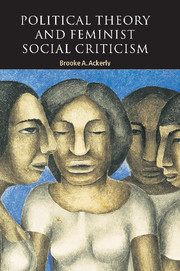Book contents
- Frontmatter
- Contents
- Acknowledgements
- 1 Silent voices and everyday critics: problems in political theory, solutions from Third World feminist social criticism
- 2 A Third World feminist theory of social criticism
- 3 Method: skeptical scrutiny, guiding criteria, and deliberative inquiry in concert
- 4 Roles: social criticism and self-criticism
- 5 Qualifications: everyday critics, multi-sited critics, and multiple critics
- 6 Third World feminist social criticism as feminism
- Bibliography
- Index
5 - Qualifications: everyday critics, multi-sited critics, and multiple critics
Published online by Cambridge University Press: 22 September 2009
- Frontmatter
- Contents
- Acknowledgements
- 1 Silent voices and everyday critics: problems in political theory, solutions from Third World feminist social criticism
- 2 A Third World feminist theory of social criticism
- 3 Method: skeptical scrutiny, guiding criteria, and deliberative inquiry in concert
- 4 Roles: social criticism and self-criticism
- 5 Qualifications: everyday critics, multi-sited critics, and multiple critics
- 6 Third World feminist social criticism as feminism
- Bibliography
- Index
Summary
Introduction
As we have seen, poor village women in Bangladesh and self-employed workers in India working to improve their lives or those of their families, women activists and feminist scholars of activism around the world working on the challenges of development in their communities, and international and local human rights activists working to change local, national, and international understandings of human rights such that they respect women's human rights have much more in common than their geography, resources, and immediate concerns would suggest. Using the Third World feminist method of social criticism, these women (and men) promote inquiry, opportunities for deliberation, and institutional changes that facilitate broadly informed and inclusive deliberations. Anyone can be a critic in her everyday or professional life. She may be an insider, outsider, or multi-sited critic, though critics with this last perspective are unique and frequently provide insights unavailable to inside or outside critics. The only qualification for Third World feminist social critics is that each critic acknowledge her criticism is an essential complement to criticisms from people with other critical perspectives. Because social change is ideally an informed, collective, and uncoerced process, social decision making needs to be informed by many and different critical voices.
Together, filling a range of roles, critics reveal and even anticipate potentially exploitative power inequalities. At the training of the Bangladeshi women's groups, the researcher, the women, and Save the Children program officer all had different critical perspectives.
- Type
- Chapter
- Information
- Political Theory and Feminist Social Criticism , pp. 150 - 177Publisher: Cambridge University PressPrint publication year: 2000



